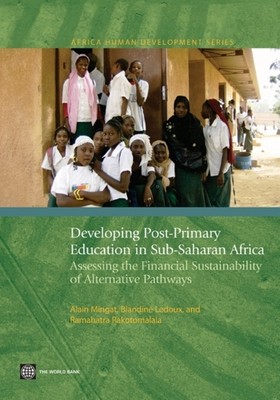
- We will send in 10–14 business days.
- Author: Alain Mingat
- Publisher: World Bank Publications
- ISBN-10: 0821381830
- ISBN-13: 9780821381830
- Format: 17.5 x 25.2 x 1.5 cm, softcover
- Language: English
- SAVE -10% with code: EXTRA
Developing Post-Primary Education in Sub-Saharan Africa (e-book) (used book) | bookbook.eu
Reviews
Description
Countries in Sub-Saharan Africa have made substantial progress in universalizing primary school completion. Many young Africans are completing primary schooling, and many more will do so in the coming years. The pressure--already strong--to expand secondary and tertiary education is expected to intensify. Finding a sustainable path for such expansion is a challenge for all countries in the region. Given the diversity across African countries, 'Developing Post-Primary Education in Sub-Saharan Africa: Assessing the Financial Sustainability of Alternative Pathways' offers no generic policy fix. Rather, it seeks to provide policy makers and their development partners with an analytical tool to inform discussion and debate about alternative options in light of country circumstances. It presents simulation scenarios that serve an illustrative function to draw attention to the implications of such options as raising the share of education in the national budget, reforming the service delivery arrangements to manage costs, diversifying the student flow beyond lower secondary education, and enlarging the role of private funding, particularly in post-primary education. The study captures the nature of the policy choices by presenting alternative packages of policies and using them to clarify the affordability of what the authors characterize as spartan and generous choices. One of the study's most valuable contributions is the flexibility of the simulation model, which can be used to adapt the package of policies to national contexts. 'Developing Post-Primary Education in Sub-Saharan Africa: Assessing the Financial Sustainability of Alternative Pathways', which contains detailed annexes with results for 33 low-income countries, will be of interest to national education policy makers and development partners, as well as education researchers and education consultants.
EXTRA 10 % discount with code: EXTRA
The promotion ends in 20d.15:26:29
The discount code is valid when purchasing from 10 €. Discounts do not stack.
- Author: Alain Mingat
- Publisher: World Bank Publications
- ISBN-10: 0821381830
- ISBN-13: 9780821381830
- Format: 17.5 x 25.2 x 1.5 cm, softcover
- Language: English English
Countries in Sub-Saharan Africa have made substantial progress in universalizing primary school completion. Many young Africans are completing primary schooling, and many more will do so in the coming years. The pressure--already strong--to expand secondary and tertiary education is expected to intensify. Finding a sustainable path for such expansion is a challenge for all countries in the region. Given the diversity across African countries, 'Developing Post-Primary Education in Sub-Saharan Africa: Assessing the Financial Sustainability of Alternative Pathways' offers no generic policy fix. Rather, it seeks to provide policy makers and their development partners with an analytical tool to inform discussion and debate about alternative options in light of country circumstances. It presents simulation scenarios that serve an illustrative function to draw attention to the implications of such options as raising the share of education in the national budget, reforming the service delivery arrangements to manage costs, diversifying the student flow beyond lower secondary education, and enlarging the role of private funding, particularly in post-primary education. The study captures the nature of the policy choices by presenting alternative packages of policies and using them to clarify the affordability of what the authors characterize as spartan and generous choices. One of the study's most valuable contributions is the flexibility of the simulation model, which can be used to adapt the package of policies to national contexts. 'Developing Post-Primary Education in Sub-Saharan Africa: Assessing the Financial Sustainability of Alternative Pathways', which contains detailed annexes with results for 33 low-income countries, will be of interest to national education policy makers and development partners, as well as education researchers and education consultants.


Reviews